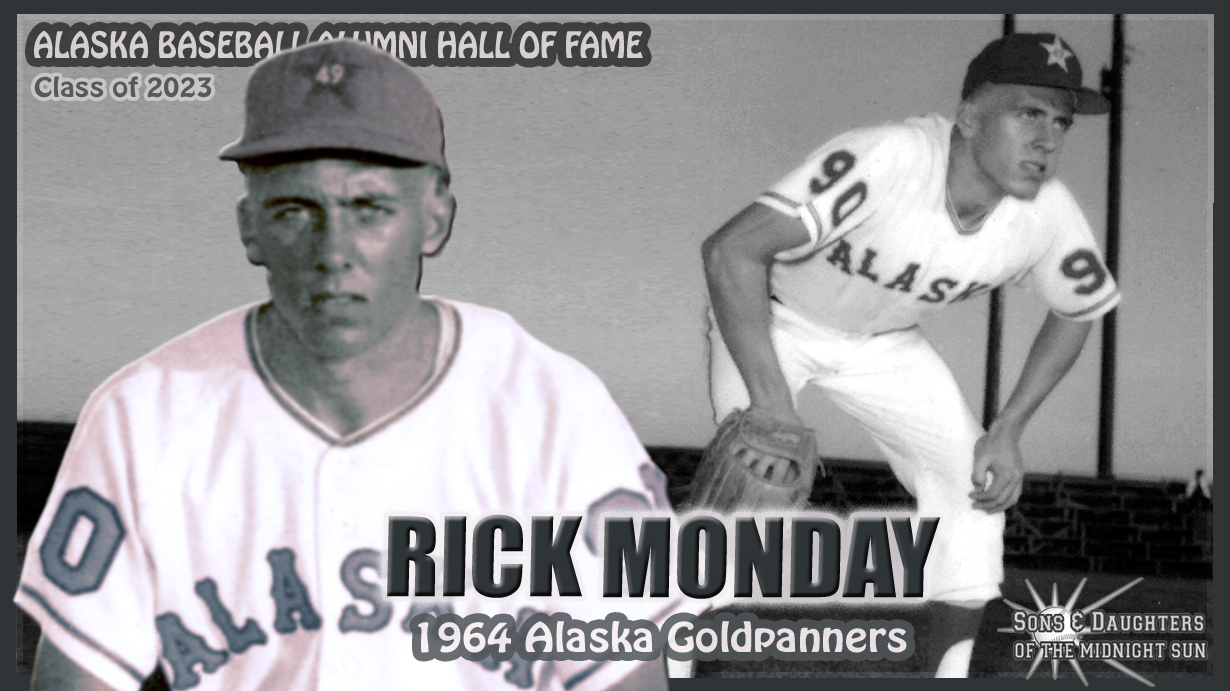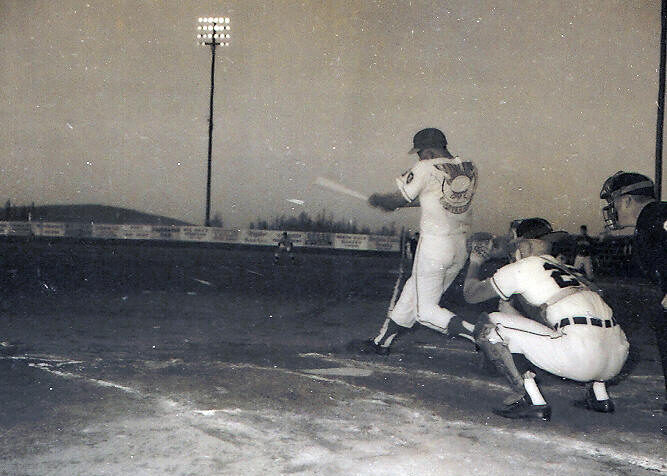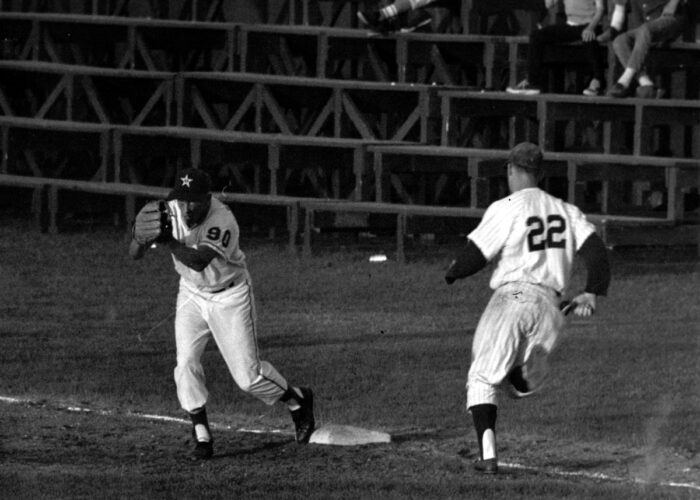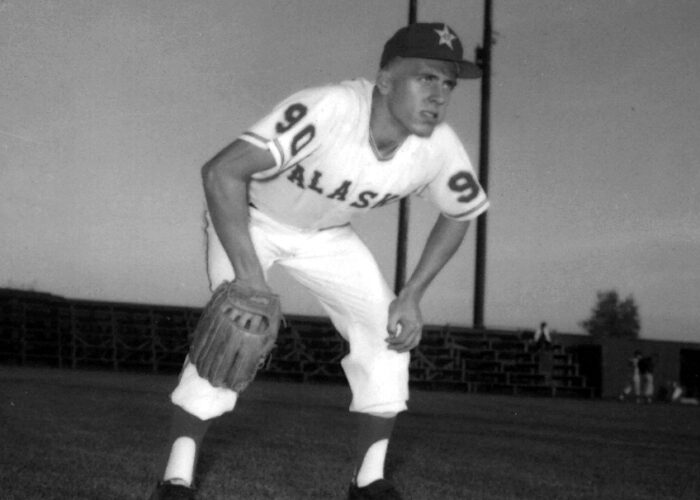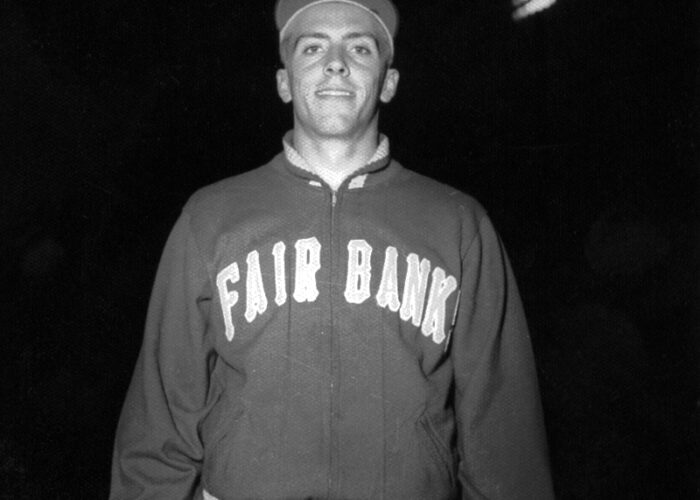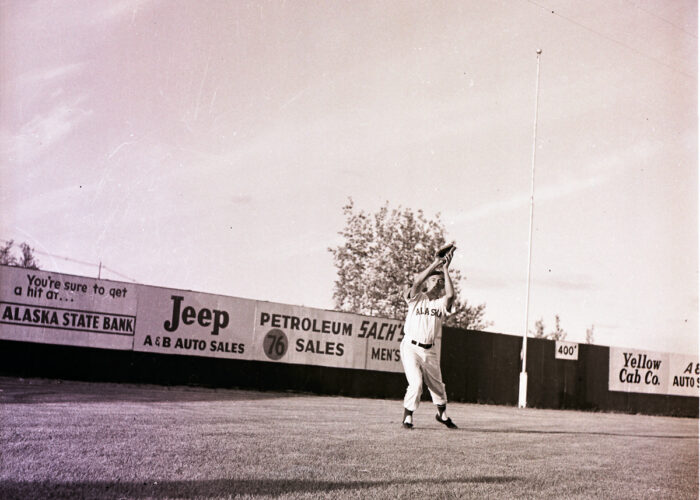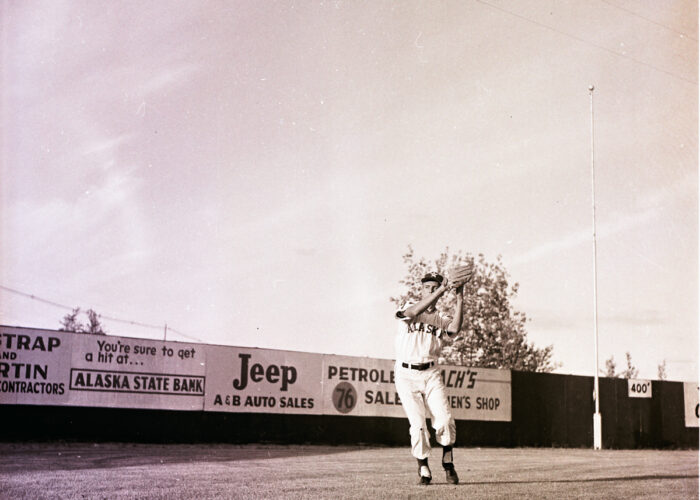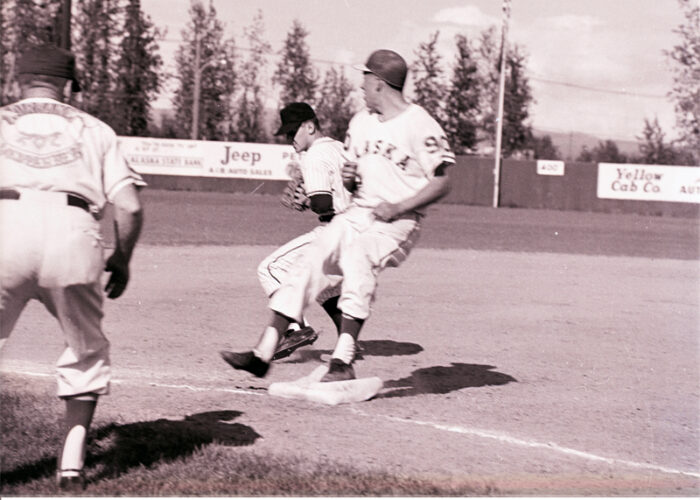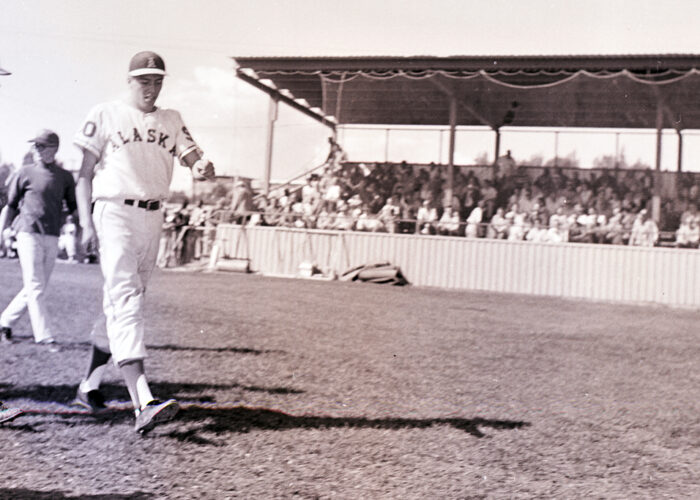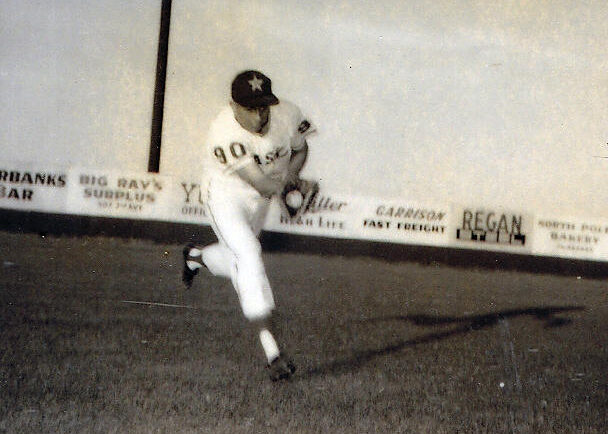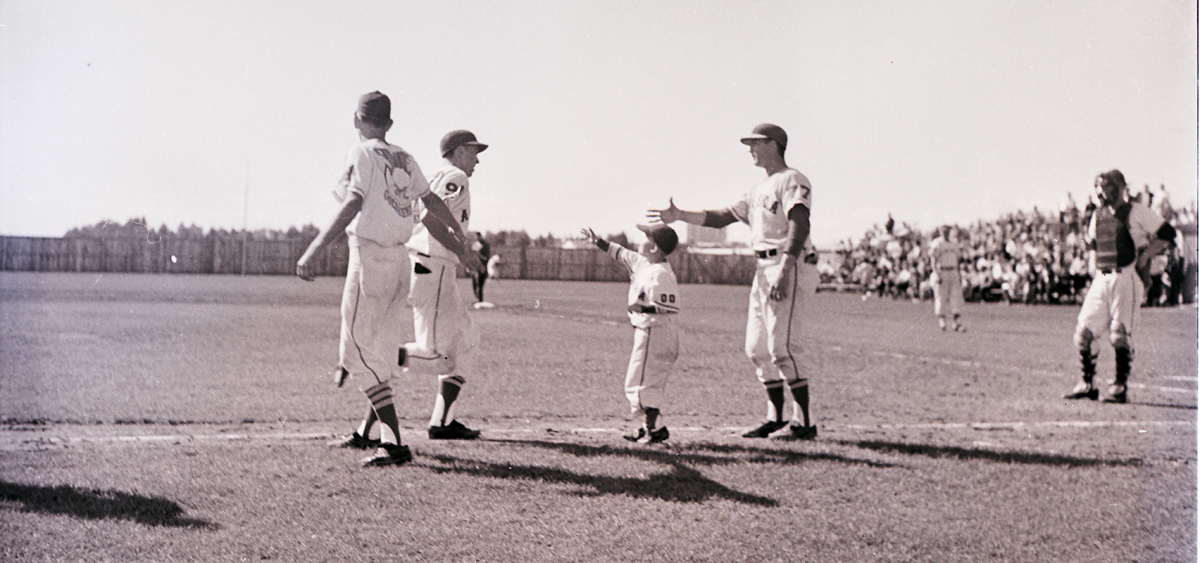ALASKA BASEBALL ALUMNI HALL OF FAME CLASS OF 2023
Day Four Inductee
ALASKA BASEBALL ALUMNI HALL OF FAME
2022 saw the first class of the AKGPA Hall of Fame inducted during the month of April. The inaugural group were drawn from players, executives, mascots, and personnel directly involved with baseball in Fairbanks, Alaska. Listed below is the first class in its entirety:
THE ’22 TWENTY: Dan Pastorini, Bill Lee, Dave Kingman, Morganna the Kissing Bandit, Tom Seaver, Dave Winfield, Barry Bonds, Mark McGwire, Jason Giambi, Bowie Kuhn, Andy Messersmith, Alvin Davis, Bob Boone, Sean Timmons, Allan Simpson, Bruce Robinson, Rod Dedeaux, H.A. (Red) Boucher, Hap Dumont, and Don Dennis.
2023 will see the induction of a new member into our Ball Hall every day during the month of April until the class is complete on the 20th.
Join us during the month of April for our second countdown of the Alaska Goldpanners Alumni Association Hall of Fame – Class of 2023.
’23 TWENTY HALL OF FAME, DAY FOUR INDUCTEE:
RICK MONDAY
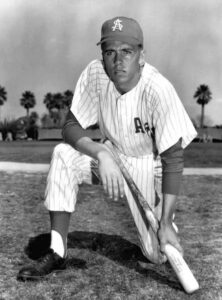 Robert James “Rick” Monday Jr. (born November 20, 1945) is an American former professional baseball player who now serves as a broadcaster. He played in Major League Baseball (MLB) as a center fielder from 1966 to 1984, most notably as a member of the Chicago Cubs and the Los Angeles Dodgers with whom he won a World Series championship in 1981.
Robert James “Rick” Monday Jr. (born November 20, 1945) is an American former professional baseball player who now serves as a broadcaster. He played in Major League Baseball (MLB) as a center fielder from 1966 to 1984, most notably as a member of the Chicago Cubs and the Los Angeles Dodgers with whom he won a World Series championship in 1981.
CAREER HIGHLIGHTS:
– 1965: First-ever MLB Draft Pick
– 1966: Active Duty as Marine Corps Reservist
– 1966: Won League Title with Mobile A’s (Double-A Southern League)
– 1981: World Series Champion
– 2x MLB All-Star (1968-78)
2008: Peace On Earth Medallion Recipient
“Every year, I see the first player chosen and I know what’s ahead of him. The expectations can get to you if you’re not strong.”
|
PLAYING CAREER: K.C. / Oakland Athletics (1966–1971) |
BROADCASTING CAREER: Los Angeles Dodgers (1985-Present) |
NEWS CLIPPINGS:
– Baseball Reference Statistics Page (https://www.baseball-reference.com/players/m/mondari01.shtml)
– Los Angeles Dodgers Broadcaster Page (https://www.mlb.com/dodgers/team/broadcasters)
He was nominated for an Emmy as host of the Dodgers’ pregame show on KTTV’s “Dodger Central” in 1988 and he earned an Emmy for Live Sports Coverage in 2001. Monday has also called games for the College World Series and the Padres.
– SABR: April 25, 1975 – Rick Monday’s Great Play Saves American Flag at Dodger Stadium (https://sabr.org/gamesproj/game/april-25-1976-rick-mondays-great-play-saves-american-flag-at-dodger-stadium/)
Monday handed the flag to Dodgers pitcher Doug Rau. The fans, stunned at first, instinctively reacted to the organist and began to sing “God Bless America.”
– Wikipedia: Rick Monday (https://en.wikipedia.org/wiki/Rick_Monday)
– Wikipedia: 1965 Major League Baseball Draft (https://en.wikipedia.org/wiki/1965_Major_League_Baseball_draft)
VIDEO HIGHLIGHTS:
FIRST-EVER MLB DRAFT PICK
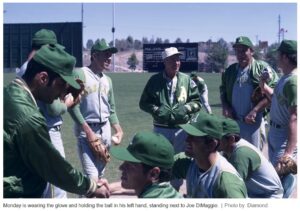 The Alaska Goldpanners of Fairbanks own the Major League Baseball draft like no other team in baseball history. There have been well over 1,200 player selections devoted to Fairbanks ballplayers, dating back to 1965 and Rick Monday — the very first player ever drafted by a major league franchise.
The Alaska Goldpanners of Fairbanks own the Major League Baseball draft like no other team in baseball history. There have been well over 1,200 player selections devoted to Fairbanks ballplayers, dating back to 1965 and Rick Monday — the very first player ever drafted by a major league franchise.
Of those picks, there have been 125 first round selections, and 19 were either the very first or second pick of the entire draft! In addition, there have been over 200 players to reach Major League Baseball. This, too, is a record among all non-professional teams, and the 16% average of drafted Goldpanners to reach MLB is well ahead of the average ratio of 1 draftee in every 33 (3%) to reach baseball’s pinnacle .
Dodgers broadcaster Rick Monday, who played 19 years in the major leagues from 1966-84, was the No. 1 selection overall by the Kansas City Athletics in baseball’s first amateur draft in 1965. The 1964 Goldpanners infielder/outfielder recalls that historic draft 46 years ago:
“Nobody really knew how the process was going to work. I had talked to quite a few ballclubs, but Kansas City was going to have the first pick. Their scout, Art Lilly, had talked with me very briefly when I was with Arizona State. He said there was a real good chance that the Athletics would select me as the number one pick. But on the periphery of all of this, nobody knew exactly what was going to happen. No one knew the effect it was going to have on both baseball overall and the people who were going to be signed out of high school or college.
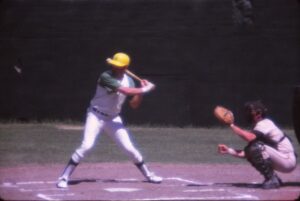 Actually, I had attorneys coming to me saying, “Look, let’s take this to court because if you’re selected number one, why should you negotiate with only one ballclub?” And my first question was “How long will this process take?” They said, “Oh, about three to five years.” I said, “Forget that, I’m going to play baseball.”
Actually, I had attorneys coming to me saying, “Look, let’s take this to court because if you’re selected number one, why should you negotiate with only one ballclub?” And my first question was “How long will this process take?” They said, “Oh, about three to five years.” I said, “Forget that, I’m going to play baseball.”
So we were in Omaha, Nebraska on the day of the draft. Arizona State was ready to play the opening game of the College World Series. We were in uniforms, sitting in the stands and waiting for the preceding game to be over. Someone comes up and says “It’s just come out that you were Kansas City’s first pick in the draft.” I went out that night and struck out three times.
Then (Kansas City Owner) Charlie Finley flew into Omaha and Sal Bando and I were drafted off the same team. It was an opportunity for me to reach out and try to grab the brass ring, something I dreamed about as a kid wearing a Little League uniform and watching the Dodgers play in the Coliseum. .
What’s nice about having been the first selection in the very first draft is that I get to relive the dream and the opportunity when that door was opened. Every year in June, it takes me back to that very first year.” .
Four days after he was drafted, with A’s owner Charles O. Finley in the stands, Monday homered in a 2-1 win over Ohio State to lead the Sun Devils to their first College World Series championship. Monday would sign the largest bonus in the 1965 draft, $100,000, and went on to enjoy a productive 19-year big league career. He remains in the game as a broadcaster for the Los Angeles Dodgers.
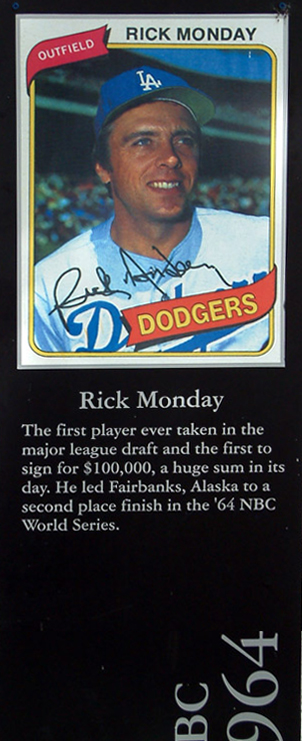 A real mama’s boy
A real mama’s boy
First-ever No. 1 pick Rick Monday had an unusual agent
By Lyle Spencer
May 24, 1999
The first player taken in the first amateur draft ever conducted by Major League Baseball was represented by his mother. Yes, times have changed.
“Tommy Lasorda can tell you my mom, Nelda, drove a hard bargain,” Rick Monday said recently. “Tommy once told me my mom was the best negotiator he ever dealt with.
“He was a scout at the time, trying to sign me with the Dodgers out of Santa Monica High School in 1964. She got him to raise his offer from $4,000 to $20,000 one night.
He would make his proposal, and Mom would say, `Rick wants to play for the Dodgers, but he’s going to go to college.’
Tommy would come back with another offer. Same thing: `He’s going to college.’
Tommy didn’t give up easily.
“I went to college, anyway — and everything worked out just fine.”
After two seasons at Arizona State University, where the 6-foot-3, 200-pound phenom evoked comparisons to Mickey Mantle with his rare combination of power and speed, Monday was the first choice of the Kansas City Athletics in the 1965 draft.
“At the College World Series, we won the national championship, beating Ohio State, and they held the first-ever draft and I was taken by Kansas City,” recalled Monday, who does radio play-by-play now for his hometown Dodgers. “I was 19, so that was pretty heady stuff.
“So, now I’m back home in Santa Monica, and Charlie Finley came to my mom’s house to negotiate. That was really something, as you can imagine. Charlie said, `Here’s what we have for you; we can’t give you any more.’ My mom and I told him what we wanted, after taxes. We went back and forth. It took a while, but we finally hammered out a deal.”
The struggling A’s were a team of great opportunity for a slugging center fielder who ran like the wind and hit a ball tremendous distances.
“I was a September call-up [in 1966] and stayed in the big leagues from 1966 through 1984. That’s 19 seasons in the big leagues, and I’m proud of that. Not many first-round picks play as long as I did.”
After one full season in Kansas City, Monday moved with the A’s to Oakland. There, he was joined in the outfield by another ASU product, Reggie Jackson, and former Sun Devil teammate Sal Bando.
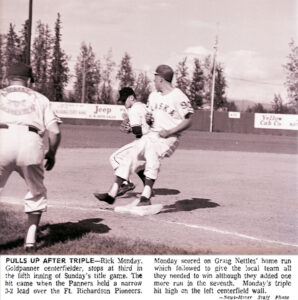 After four seasons in Oakland, Monday was traded to the Cubs. In Chicago, Rick began to fulfill his immense potential, producing career highs of 32 homers, 77 RBI and 107 runs scored while batting .276 in 1976. That winter, he was sent home to LA in exchange for Bill Buckner, and Monday spent the final eight seasons in Dodger Blue with teams that won four NL West titles, three pennants and a World Series in 1981. His dramatic homer off Steve Rogers in Game 5 of the ’81 NLCS carried the Dodgers past the Expos and into the World Series.
After four seasons in Oakland, Monday was traded to the Cubs. In Chicago, Rick began to fulfill his immense potential, producing career highs of 32 homers, 77 RBI and 107 runs scored while batting .276 in 1976. That winter, he was sent home to LA in exchange for Bill Buckner, and Monday spent the final eight seasons in Dodger Blue with teams that won four NL West titles, three pennants and a World Series in 1981. His dramatic homer off Steve Rogers in Game 5 of the ’81 NLCS carried the Dodgers past the Expos and into the World Series.
“Rick Monday was a wonderful player for me and a great guy to have on a ballclub,” Lasorda said. “I guess you could say I finally got my man.”
Monday can relate to the weight of expectations that fall on the athlete deemed No. 1 by the scouts. It can be a blessing and a curse. “Every year,” Monday said, “I see the first player chosen and I know what’s ahead of him. If he goes 3 for 4, someone will say, `Why not 4 for 4?’
Whatever you do, it’s expected. If he goes 0 for 4, they’ll say he’s a bust. And he’s going to be compared with this player and that player.
“The expectations can get to you if you’re not strong. With me, they picked a left-handed hitter with speed — I could run in those days, before I started having leg injuries. Mantle was the guy some people chose.”
While Monday didn’t quite reach those expectations, he did finish with very respectable career numbers: 241 homers, 775 RBI, 950 runs scored and a .264 career average.
Lyle Spencer is a columnist for the Riverside Press Enterprise in California
Check back tomorrow as we unveil the latest ’23 TWENTY inductee.

